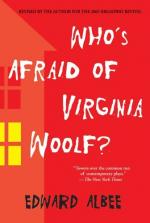|
This section contains 900 words (approx. 3 pages at 400 words per page) |

|
Absurdity
Literally meaning "out of harmony," absurd was the existentialist Albert Camus's designation for the situation of modern men and women whose lives lack meaning as they drift in an inhuman universe. Virginia Woolf probes the question of what happens to human beings when they no longer have recourse to the illusions which had previously given their lives meaning. The theme of absurdity is a prevalent one in Albee's plays, as is suggested by the frequent references to the theatre of the absurd in analyzing his writing. Albee describes the philosophical notion of absurdity as "having to do with man's attempt to make sense for himself out of his senseless position in a world which makes no sense ... because the moral, religious, political and social structures man has erected to 'illusion' himself have collapsed." Perhaps the most articulate and sustained expression of the absurdity of existence is found in...
|
This section contains 900 words (approx. 3 pages at 400 words per page) |

|




